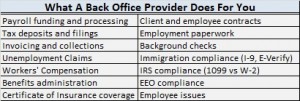Offering contract staffing has many advantages. It helps you generate consistent cash flow. It can strengthen client loyalty by making you a one-stop shop for all their staffing needs. And it can give you an extra tool to overcome hiring objections such as hiring freezes and budget constraints. So if it so great, why aren’t ALL recruiters doing it?
 Well, there is a misconception that contract staffing is hard. And it can be if you are trying to do it alone. Most recruiters, especially those running small firms or “one-man shows,” don’t have the resources or time to handle the additional tasks. But that doesn’t mean recruiters have to turn down lucrative contract staffing job orders. Instead, they could utilize a contract staffing back-office to handle all the financial, administrative, and legal issues. In this scenario, the back-office becomes the legal Employer of Record for the contractor and assumes all of the employment responsibilities. (See chart).
Well, there is a misconception that contract staffing is hard. And it can be if you are trying to do it alone. Most recruiters, especially those running small firms or “one-man shows,” don’t have the resources or time to handle the additional tasks. But that doesn’t mean recruiters have to turn down lucrative contract staffing job orders. Instead, they could utilize a contract staffing back-office to handle all the financial, administrative, and legal issues. In this scenario, the back-office becomes the legal Employer of Record for the contractor and assumes all of the employment responsibilities. (See chart).
All you need to do is match the job order to the contract candidate, and confirm the bill rate and pay rate. Then you can contact the back-office to handle the details. In essence, they become another part of your business, leaving you to do what you do best – recruit.
Because the back-office is going to handle critical tasks, you want to select it carefully. In addition to confirming that the back-office provider is handling the employment responsibilities, you may want to ask the following questions:
What positions do you accept?
Some back-offices only place individuals in office environments due to workers’ compensation restrictions. Make sure your back-office can accept the positions for which you are recruiting.
What happens if a client doesn’t pay an invoice?
Are recruiters responsible for client invoices that are “uncollectable?” What are the standard invoicing terms?
Do you provide contractor benefits?
If you want to attract and retain the best contract candidates, make sure your back-office offers benefits (medical, dental, vision, and life insurance, 401k, etc.).
Do you recruit candidates and fill your own job orders?
If you want to ensure that the candidate remains “your” candidate, you may want to confirm that the back-office does not do any recruiting.
Do I have to sign a contract to use the back-office?
If so, you may be obligated to use their services for a certain period of time.
Do you run background checks on contractors?
Ensuring that a background check is run on every contractor can help you protect yourself from liability and maintain your reputation.
Who becomes the legal Employer of Record and takes the responsibility for the worker?
A true contract staffing back-office will take this responsibility. If the vendor is only providing payroll funding, your client or you may end up retaining employment responsibilities.
Some recruiters are concerned about how they will explain the back-office to their client companies. Luckily, this is not as tricky as it may sound. Simply explain that the back-office will handle all of the administrative, “behind the scenes” issues, and you will handle all of the recruiting issues as the “front-office.” Stress that you are still their go-to person for all recruiting needs. Knowing that you are still there for them and will assist them with any recruiting-related issues should ease their concerns.
Contract staffing can be complicated, but it doesn’t have to be. By utilizing a contract staffing back-office, you can reap all of the rewards of contract staffing without the headaches.